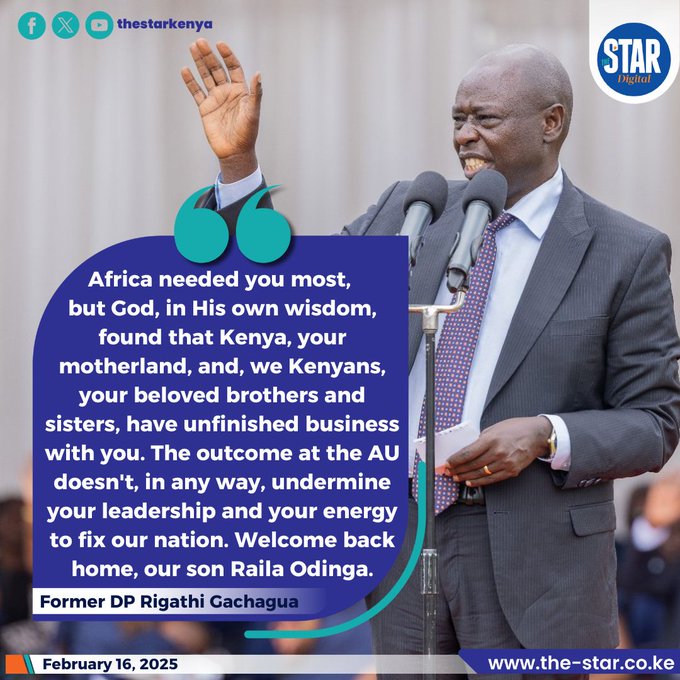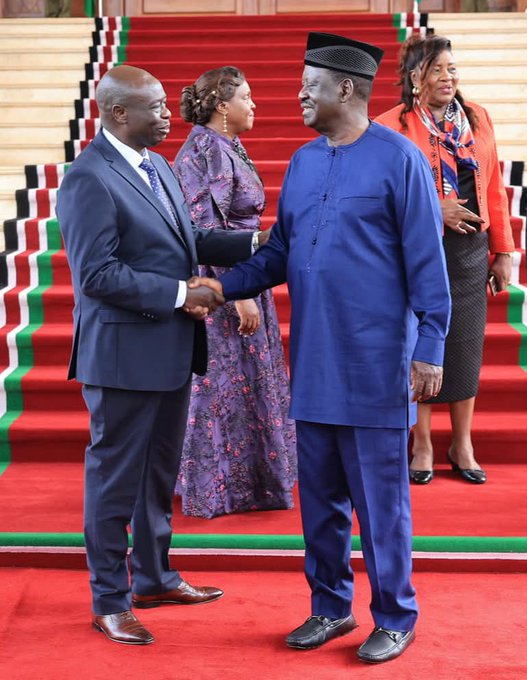NAIROBI, Kenya – Former Deputy President Rigathi Gachagua has extended an unexpected olive branch to Raila Odinga following his loss in the high-stakes race for the African Union Commission (AUC) chairperson seat.
In a statement that raised eyebrows, Gachagua suggested that Kenya still has “unfinished business” with the longtime opposition leader, framing his return as essential for the country’s political landscape.
Odinga, who was a front-runner in the early rounds of the AUC contest, was eliminated in the sixth round after securing 22 votes against Djibouti’s Mahmoud Ali Youssouf, who ultimately won with a decisive 33 votes in the seventh round.
While some may view the loss as a setback, Gachagua took a different angle, urging Odinga to see it as a sign that “God, in His own wisdom,” had other plans.
Former Deputy President Rigathi Gachagua has expressed solidarity with ODM leader Raila Odinga following his loss in the African Union Commission chairperson race. #starkenyanews
“Africa needed you most, but God found that Kenya, your motherland, and indeed, we Kenyans, your beloved brothers and sisters, have unfinished business with you,” Gachagua remarked.
It was a notable shift in tone from a politician who has often been one of Odinga’s fiercest critics.
His statement hinted at a broader political recalibration—especially given his recent rocky relationship with President William Ruto.
A Symbol of Hope, Even in Loss
Despite falling short in the AU contest, Odinga’s campaign was widely seen as a reflection of Kenya’s growing influence on the continent.
Gachagua acknowledged this, stating that Odinga’s candidacy represented “the hope and progress Kenya brings to Africa and the world.”
Baba @RailaOdinga, you put on a brave fight, elicited energy, resilience, and the undefatigable Lion of Africa.You came in a credible 2nd as you held the Kenyan Flag high in a hotly contested seat of the AUC Chairmanship.You did not lose; the majority had their way. The…
His remarks aligned with the broader sentiment among Odinga’s supporters, who saw his bid as a moment of national pride rather than a personal failure.
Odinga, for his part, graciously accepted the outcome.
In a post-election statement, he congratulated Youssouf and emphasized the importance of strengthening democratic values across Africa—perhaps a hint that his political ambitions remain very much alive.
With his AU bid behind him, all eyes are now on Odinga’s next move in Kenya’s political scene. Will he reclaim his role as a vocal opposition leader, or does he have another strategic pivot in mind?
Gachagua’s remarks suggest that, whether as an ally or an adversary, Odinga’s influence is still seen as critical in shaping Kenya’s governance future.





